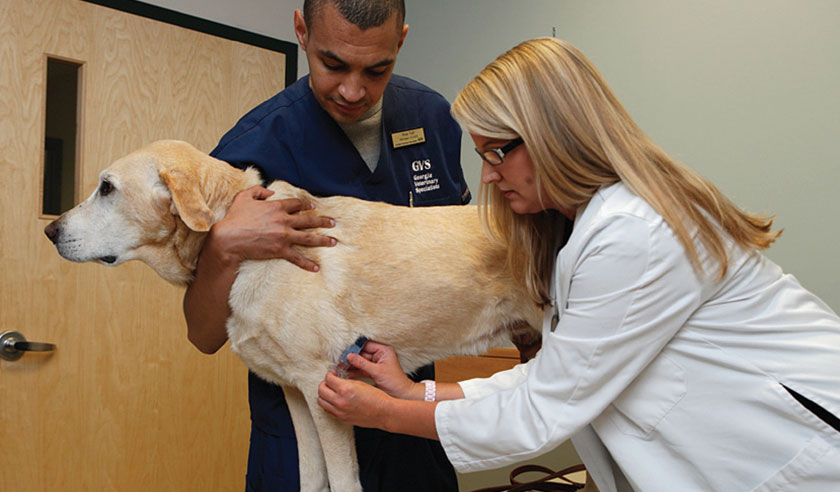Heartworm disease, caused by Dirofilaria immitis (D. immitis), is devastating for dogs[1]. “Baby” heartworms (technically called larvae) are transmitted to your dog through bites from infected mosquitoes. The larvae then grow into adult heartworms within a dog’s bloodstream, lungs, and heart. These adult heartworms can grow to be up to a foot long[1] and they can cause severe harm, or even death, to your dog. Thankfully, heartworm disease is easily preventable in dogs.

It’s near impossible to stop mosquitoes from biting, so you should have your dog tested yearly and keep them up-to-date on a heartworm preventative. These medications ensure that heartworm larvae are killed before they can grow up and cause serious harm to your dog.
In the early stages of heartworm disease, it’s likely that a dog won’t show symptoms at all. The longer that the disease progresses, the more likely you’ll see signs of it. Active dogs, dogs with other health problems, and ones heavily infected with heartworms often show more severe symptoms[2].
Symptoms of heartworm disease in dogs can include[2]:
- Mild, persistent cough
- Reluctance to exercise
- Fatigue after moderate activity
- Decreased appetite
- Weight loss
- Difficulty breathing
- Fluid-filled, swollen abdomen (“belly”)
If your dog is showing any of the signs listed above, it’s important to get them to the veterinarian for evaluation as soon as possible. The sooner your vet is able to diagnose heartworm disease, the better chances your dog has of survival.
Dogs infected with large numbers of heartworms can develop cardiovascular collapse, a sudden blockage of blood flow within the heart. Symptoms include a sudden onset of labored breathing, dark bloody or coffee-colored urine, and pale gums[2]. Without prompt surgical removal of the heartworms, there is a low chance of survival.
A simple blood test is the first step to diagnosing this horrible disease. If confirmed, additional testing, including x-rays may be necessary.
Prevention vs. Treatment
While there are safe and effective treatments for heartworm in dogs, the treatment process is expensive, can be logistically difficult, and may be associated with complications. Because of this, and because the damage from adult heartworms can persist even after successful treatment, this is one condition that you want to prevent and protect your dog from.
ZPC-00325R1
Important Safety Information: Use ProHeart 6 in dogs 6 months of age or older and ProHeart 12 in dogs 12 months of age or older. Do not administer to dogs that are sick, debilitated, underweight, have a history of weight loss, or to those previously found to be hypersensitive to the drug. Hypersensitivity reactions may occur in some dogs when ProHeart is administered alone or with vaccines. Anaphylactic and anaphylactoid reactions can result in death and should be treated immediately with the same measures used to treat hypersensitivity reactions to vaccines and other injectable products. Reported side effects in clinical trials included vomiting, lethargy, diarrhea, anorexia, and hypersensitivity reactions. People should avoid inhalation, contact with eyes, or accidental self-injection. Certification is required before veterinarians and staff administer these products. See Prescribing Information for ProHeart 6 and ProHeart 12.
- Keep the Worms Out of Your Pet’s Heart! The Facts about Heartworm Disease. FDA. https://www.fda.gov/animal-veterinary/animal-health-literacy/keep-worms-out-your-pets-heart-facts-about-heartworm-disease. Accessed June 12, 2019.
- Heartworm in Dogs. American Heartworm Society. https://www.heartwormsociety.org/heartworms-in-dogs. Accessed June 12, 2019.








